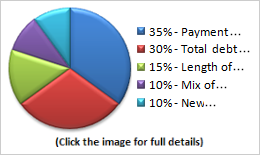Dispute process
Are Credit Report Disputes Pointless?
Credit report disputes are one of the easiest credit repair strategies. By law, you’re entitled to an accurate report and you have the right to dispute information you believe to be inaccurate, incomplete, or unverifiable. Credit bureaus have to remove this type of information from your credit report after an investigation proves your dispute to be accurate.
Results of Credit Report Study
Are credit report disputes really the best way to spend your credit report efforts? A new report released by the Policy and Economic Research Council (PERC) in May 2011 revealed that less than 1% of credit reports actually have an error that, if corrected, would improve credit scores more than 25 points. The study, called U.S. Consumer Reports: Measuring Accuracy and Dispute Outcomes, also showed that only half a percent of those consumers who disputed report errors saw their scores improve to the next tier. According to this study, it’s very unlikely that a credit report dispute would move your score from Bad to Poor or from Poor to Fair.
Do the Study Results Apply to You?
This information makes it seem that credit report disputes are a waste of time, but they’re still a worthwhile effort, especially if you have significant errors on your report. More than half the people (53%) who participated in the study had VantageScores above 800, that is, scores are in the “A” and “B” categories. It stands to reason this particular segment of the population wouldn’t have serious errors on their report dragging down their scores. On the other hand, only 29% of participants Read more…
What Are Some Common Strategies to Pay Off Derogatory Accounts?
The path to credit repair might require you to pay off some (or all) of your past due accounts. You could easily feel overwhelmed by the amount of your past due accounts, but don’t let this discourage you or cause you to delay your credit repair. You can pay off these accounts one at a time.
Figure Out What You Owe
Make a list of all the negative accounts on your credit report that have outstanding balances. Your credit repair agency may not be able to get these removed these from your credit report unless you can pay off the balance. If you put together a list of the accounts you owe, you can better come up with a plan to pay off all the accounts.
Your accounts may have different levels of delinquencies. Some may be late, but not yet charged-off. Others may be charged-off. And you may have some accounts that are with collection agencies. How you pay your accounts depends on how delinquent they are. For example, if you have accounts that are late, but not charged-off, you might pay them to keep them from becoming charged-off, especially if you don’t have any other charge-offs on your report.
Pay for Delete
You may be able to talk the creditor into removing the negative item from your report in exchange for payment. The pay for delete strategy can be difficult because Read more…
What Should You Do When the Credit Reporting Agencies Fail to Respond?
 You’ve put forth a lot of work in repairing your credit. You have filed your disputes with the credit reporting bureaus. You figure you have it all taken care of until weeks pass by and you have received no reply from the credit bureaus.
You’ve put forth a lot of work in repairing your credit. You have filed your disputes with the credit reporting bureaus. You figure you have it all taken care of until weeks pass by and you have received no reply from the credit bureaus.
Credit bureaus have the legal obligation to reply to your correspondence within a 30 day time frame. The Fair Credit Reporting Act states that the bureaus must have their investigation completed on your behalf within four weeks. In some cases things do not go as planned. So what do you do now? Read more…
Credit Repair Don’t: Dispute Everything On Your Credit Report
When you repair your credit, there are steps you must take to ensure your credit history is correct and always up to date, otherwise it can reflect poorly on your credit score. In order to keep accurate information contained in your report, you may need to file a dispute to the credit reporting bureaus to correct the error. But be cautious – if you try to dispute data by yourself, make sure that is in fact true or your dispute may be dismissed as frivolous.
How Investigations Work
The credit reporting bureaus receive data from creditors on a monthly basis. The information shows how you manage your credit, pay your bills, the amount of credit you are extended and have used, and the type of account you have. The credit bureaus take this information and compile it into a history report. Because the data is managed by humans, there is always a chance some of the information may be reported incorrectly. A consumer has a responsibility to check their information and make sure it is correct. They can do this by order a copy of their credit report and reviewing each detail.
humans, there is always a chance some of the information may be reported incorrectly. A consumer has a responsibility to check their information and make sure it is correct. They can do this by order a copy of their credit report and reviewing each detail.
Once a consumer notices errors, they should complete the credit bureaus form for filing a dispute. The information that is incorrect should be reported to the bureau which will then lead to an investigation by the credit reporting agency. The bureau will then contact the creditor with questions about the information being reported. During a 30 day period the creditor must respond with the corrected information, prove the information is being reported as accurate, or they may not respond at all. If corrected information is provided, the credit bureau will change it on the report for the consumer. If the information is accurate, the consumer will be alerted. If the creditor does not reply at all, the information will be eliminated from the consumer’s report. Consumers will receive written correspondence with the results of the investigation that details any action taken. Truth be told, it can be a tedious process.
In the event you were denied credit due to incorrect information being reported, the consumer credit bureau will send a corrected copy of your credit report to anyone that had received a copy of your report within a two year time frame. In order to instigate this action, a consumer must request this be done in writing by the consumer.
Disputing Real Issues
There are some inexperienced agencies that will attempt to file disputes on all of your credit information in the hopes some creditors will not respond and the information will be eliminated, which is discouraged. Only a handful of credit repairing agencies have the expertise and experience to be able to decipher what should be disputed and what should be left alone.
If doing it yourself, remember that the credit reporting agency has the right to refuse an investigation if they feel the dispute is frivolous, so you should be well informed before attempting. If you have several legitimate disputes, you should file them as soon as you have discovered the inaccurate information. However, keep in mind that filing too many disputes in an effort to have information removed can be detrimental to your credit repair success.
Once a dispute is filed, be sure to follow up regularly to ensure the information is correct. Many consumers will make the mistake of doing the initial work and letting the rest fall by the wayside. If inaccurate information remains on your credit report, your score will not improve.
Too Many Disputes Could Be “Frivolous”
If you send too many disputes at one time, the credit bureau can decide these disputes are frivolous and refuse to process the disputes. The law allows them to do this. When this happens, none of your disputes are processed and nothing is removed from your credit report.
The only exception is when you’ve been a victim of identity theft and none of the accounts on your credit report belong to you. Even then, you should have documentation, like an ID theft report or affidavit, showing that the accounts were fraudulently opened. Read more…
How To Construct a Credit Dispute Letter to Your Creditors
In order to repair your credit, you will first need to know what your credit report says about you. The first step in credit repair is ordering copies of your credit reports from the three major reporting agencies: Experian, Equifax, and TransUnion. Once received, you need to carefully review all information contained in the report. Check for accuracy line by line. Because the reports are subject to human error, it is more than likely your credit score has been decreased due to erroneous information. Read more…







Let's connect!